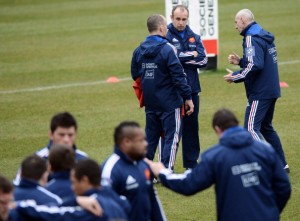
Man for the job: John Plumtree may have been dumped by Natal Sharks, but he is now Ireland's forwards coach
By Alan Dymock
HAVING BEEN relieved of his position with the Natal Sharks by incumbent CEO John Smit, John Plumtree has not taken long in securing new employment as he has signed up to join Ireland as an assistant to Joe Schmidt.
The Kiwi will be a forwards coach, joining compatriot Schmidt and Australian Les Kiss on the coaching team. With such a heavy influence from the Southern Hemisphere on the Emerald Isle, it is interesting to note which other countries are not led by indigenous coaches. Not to suggest that a country is better off one way or the other, of course, but simply for the acknowledgment that southern style still tends to trump northern nous in the eyes of the greater rugby public or at the very least, a big name from any country seems to be a better catch for unions than those who have climbed up through the ranks and pathways in that country.
Ireland are now led by a Kiwi, as are Wales, and Scotland will be as of 2014. Wales do have Rob Howley and Neil Jenkins to impart some ‘local knowledge’. However, England’s all-English coaching caste stands out in comparison to Wales’ with Warren Gatland and Shaun Edwards.
Scotland have no indigenous coaches, with Vern Cotter coming in next year and Scott Johnson stepping up to oversee everything and there is Welshman Jonathan Humphreys as forwards coach and Australian Matt Taylor running the defence.
However, does it matter as long as the personnel do the job or improve a country’s standing?
This heralding of overseas talent is certainly en vogue in the UK and Ireland, with Italy also relying on coaches from France to lead their team. Looking at the rest of the top 15 teams in the IRB world rankings, New Zealand, Australia and South Africa all have home-grown coaches. Argentina, Samoa, Tonga and Fiji are all led by head coaches from their own country, too. At the lower reaches of that list are Japan and Canada, who are led by Aussie Eddie Jones and Kiwi Kieran Crowley respectively.
It seems that the desire for influence from outside your shores also extends through the British and Irish leagues. In the Aviva Premiership, Leicester, Newcastle, Northampton and Worcester have English head coaches while the rest draw inspiration from elsewhere. In the RaboDirect Pro12, Cardiff, Glasgow, the Dragons, Ospreys and Zebre all have coaches from home.
Jingoism aside though, it is hard to gauge whether having all-local leaders works. In France’s Top 14, only Clermont Auvergne and Stade Francais have non-French coaches and their national team is led by a Gallic trio of Philippe Saint-Andre, Yannick Bru and Patrice Lagisquet, yet les Bleus are now talked about in hushed tones as if their national side is doomed to years of failure.
The sides like Samoa hoping to establish themselves in the top tier of rugby also look inwardly for personnel, however they are trying to build from a solid core rather than instantly win. No longer is it assumed that a good coach from abroad can lift a system, but rather that the system needs built first.
Plumtree has said he looks forward to “putting smiles on Irish faces” and that he wants to make Ireland tougher to beat. Great, if he can. Perhaps things will be that much easier to work around in Dublin, though, because there are so many men with Kiwi connections in Ireland – with Pat Lam at Connacht, Mark Anscomb at Ulster and Rob Penney at Munster – close at hand.
Is it therefore assumed that Ireland already have the system for success, though?







